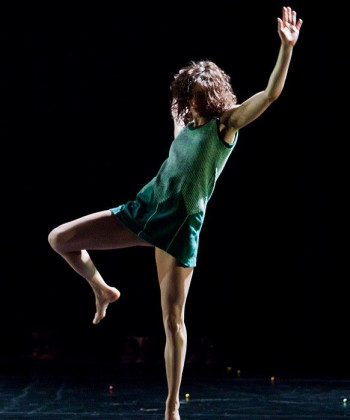


The latest production of the Symptoms' from 2012 is happening on two levels. Every member of the audience can vote, whether they want to view the dance performance on the stage or listen in the dark to newscasts from Hungary between 1938 and 1944. Vote makes use of an interactive technical solution to treat the themes of collective decision and individual responsibility — with the participation of the audience.
There is an invisible boundary somewhere. It does not become visible until you have crossed it and everything has become irreversible. We are approaching it.
Lábán Rudolf Award for the best dance performance of the year 2012
“Réka Szabó’s production aims to touch the intellect. Dancers are organised around a clever central idea, and the functionality of choreography is complemented by the textual aesthetics of Sándor Márai’s writing. Viewers become supporting characters in a morality tale on issues of their society where dance and text feasibly and meaningfully fuse into one.” (Zita Sándor, Ellenfény)
The inexorable logic of collective decisions is both frustrating and helpful in shirking personal responsibility, even if the thing to decide is no more than what should happen on stage. The real protagonist, playwright, and director of Vote is everyone in the audience — as many as there are voting buttons. The concatenation of decisions does not end when you take your seat in the auditorium. The outcome of the fact that everyone has a choice at each moment is a uniquely different performance each evening.
How do we deal with our traumatic historic experiences in an age when history is considered by all political forces to be no more than a sheer means of self-legitimization, and is constantly rewritten as a result? And if we spare ourselves the trouble of coming to terms with and assuming responsibility for history, what is the guarantee that the tragedies of the past will not reappear in a new guise in the future? Is history, like nature, unpredictable and uncontrollable, or do the macro processes remain amenable to being shaped by individual human force?
The Symptoms have spruced up the old creative team with a brace of new, young dancers, an orchestra of versatile musicians recruited for the occasion, and even a handful of historians and psychologists. As usual, each member of the team makes a creative contribution to the process of designing the performance.
“When someone simultaneously raises the subject of votes and the proliferation of Nazism during World War II, most people will likely recall the uncomfortable fact that Hitler started to build his career as a democratically elected politician. Hitler is not specifically mentioned in Vote, a recent production by The Symptoms, albeit there is plenty here to trigger associations among the audience. And association is one of Réka Szabó’s favorite tools that she brings to bear upon choreography. What the spectator really takes home from this performance is something that is never spoken or acted out on the stage, but in individual minds — to each his own. Indeed, the best way to make sure that the message — or a message — goes through is to have everyone articulate it for himself or herself.” (Bálint Kovács, Origo)
We are thankful for Bonbonetti for supporting the creation of piece.
Co-production partner: Trafó House of Contemporary Arts